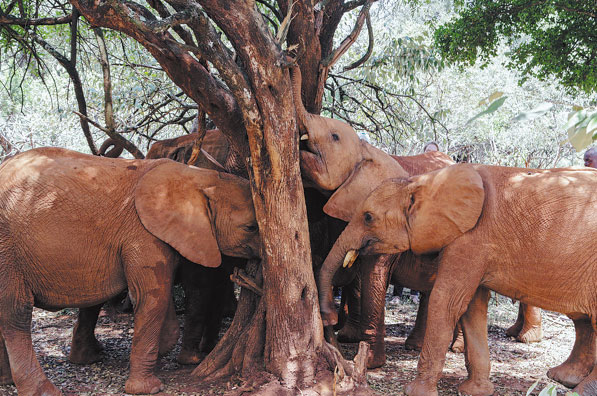Protective cloak for chimps that crack nuts
By EDITH MUTETHYA | China Daily | Updated: 2020-02-24 09:13

Wildlife protection groups attending the Conservation of Migratory Species meeting that has concluded in Gandhinagar, India, have united around a proposal to advance conservation measures for endangered nut-cracking chimpanzees whose population spans four West African countries.
The proposal calls for Guinea, Sierra Leone, Liberia and Cote d'Ivoire to work together to protect the chimpanzees, with their ability to crack open a variety of nuts using natural stone, wooden hammers and anvil materials.
The groups are thus calling for international cooperation on conservation measures to preserve this culturally learned behavior as part of broader strategies to conserve chimpanzees across their range, such as reducing human over-exploitation of nut trees in key locations.
This is in addition to action against threats faced by chimpanzees such as the bush meat and illegal wildlife trades.
"People should not only value the existence of this behavior, but should know that using wild nuts and productive trees excessively may lead to the disappearance of this behavior if degradation of habitat and the removal of nut trees continues unchecked," the proposal said.
Actions needed
Mark Simmonds, senior marine scientist at the Humane Society International, which is dedicated to promoting the human-animal bond, said it is important to take action before the chimpanzees are forever lost.
"This remarkable behavior of using tools to carefully crack open nuts without squashing their nutritionally valuable contents is learned over a number of years by young chimps from older animals, allowing them to exploit food sources that would otherwise be inaccessible to them."
The remarkable behavior has helped the chimpanzees to successfully live through dry seasons in the forests they inhabit.
The proposal calls for integration of concerted action on the nut-cracking cultures with wider work by the International Union for Conservation of Nature, the UN-Great Apes Survival Partnership, government agencies and non-governmental organizations.
Proposals include facilitating and coordinating data collection among the signatory states.
This would improve understanding of the distribution and size of chimpanzee nut-cracking cultures and the conservation status of the communities.
Another measure would be to promote public engagement by the media to encourage recognition and celebration of nut-cracking cultures as a treasure.
























